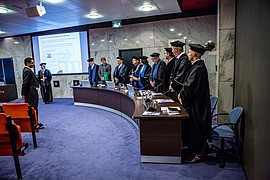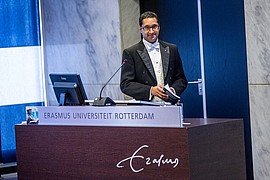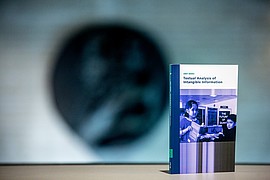PhD Defence: Andy Moniz

In his dissertation ‘Textual Analysis of Intangible Information ’ ERIM’s Andy Moniz designs an automated approach to collect and quantify information on firms’ intangible assets by drawing upon techniques commonly adopted in the fields of Natural Language Processing (NLP) and Information Retrieval.
Andy defended his dissertation in the Senate Hall at Erasmus University Rotterdam on Thursday, 16 June 2016 at 15:30. His supervisors were Prof. Cees van Riel and Prof. Franciska de Jong. His co-supervisor was Dr Guido Berens. Other members of the Doctoral Committee were Prof. J.P. Cornelissen (RSM), Prof. P.P.M.A.R. Heugens (RSM), and Prof. C.G. Koedijk (Tilburg University).
About Andy Moniz

Andy Moniz works at UBS and is responsible for the design of systematic equity strategies using unstructured data. Andy studied at Downing College, University of Cambridge, between 1997-2000. He graduated with a BA and MA in Economics and received a university scholarship and college prize. Andy began his career in 2000 as a macroeconomist at the Bank of England where he worked within the Conjunctural Assessment and Projections Division on the design of the Bank’s macroeconomic forecasting model. Between 2003-2011, Andy worked within the Quantitative Equity Strategies departments for various investment banks. During this time he became a CFA Charterholder and undertook a part-time MSc in Statistics from the University of London. In 2011, Andy moved to the Netherlands to work as a senior quantitative portfolio manager at APG Asset Management and was responsible for the design of stock selection strategies. His academic research has been presented at numerous conferences in the fields of computational linguistics, information retrieval and finance.
Thesis Abstract

Traditionally, equity investors have relied upon the information reported in firms’ financial accounts to make their investment decisions. Due to the conservative nature of accounting standards, firms cannot value their intangible assets such as corporate culture, brand value and reputation. Investors’ efforts to collect such information have been hampered by the voluntary nature of Corporate Social Responsibility (CSR) reporting standards, which have resulted in the publication of inconsistent, stale and incomplete information across firms. In short, information on intangible assets is less salient to investors compared to accounting information because it is more costly to collect, process and analyse.
In this thesis we design an automated approach to collect and quantify information on firms’ intangible assets by drawing upon techniques commonly adopted in the fields of Natural Language Processing (NLP) and Information Retrieval. The exploitation of unstructured data available on the Web holds promise for investors seeking to integrate a wider variety of information into their investment processes. The objectives of this research are: 1) to draw upon textual analysis methodologies to measure intangible information from a range of unstructured data sources, 2) to integrate intangible information and accounting information into an investment analysis framework, 3) evaluate the merits of unstructured data for the prediction of firms’ future earnings.
· View and download Andy's dissertation
Photos: Chris Gorzeman / Capital Images


